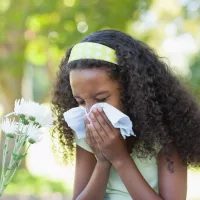
Oregon’s pollen season is starting earlier and lasting longer, thanks to climate change, with research showing airborne pollen levels increasing more than 20% in the last 30 years.
Dr. Shyam Joshi, professor of medicine and pediatrics at Oregon Health and Science University, said right now Oregon is in tree pollen season, with grass pollen season right around the corner. He explained the grass seed production in the Willamette Valley means Oregon has unusually high levels of grass pollen. About one in four adults and one in five children suffer from seasonal allergies, and Joshi stressed it is important to take them seriously.
“We often brush off allergies as ‘Oh, it’s just allergies,'” Joshi observed. “But it can really cause issues with learning even in the classroom, we see kids’ grades drop off because they’re so preoccupied with their itchy nose or itchy eyes.”
Joshi recommended if you or your child is allergic to pollen, keep the windows closed while driving or inside, and use air purifiers in the house to remove any pollen. He added medications like antihistamine nasal sprays, tablets or liquids are helpful.
With more than 60 million Americans suffering from seasonal allergies, researchers are always developing new treatments. Immunotherapy, which can change the body’s immune response to allergens, includes allergy shots. In recent years the Food and Drug Administration has approved sublingual tablets to treat reactions to grass pollen, ragweed and dust mites.
Dr. Gregory Carnevale, chief medical officer for UnitedHealthcare, suggested checking with your doctor to keep up with the latest treatments.
“One of the values of seeing a health care professional is some of these newer medications can oftentimes have less side effects,” Carnevale advised.
Joshi noted people are suffering more from allergies now than they did in the past, in part because of increased carbon dioxide in the air. He explained because plants love CO2, higher amounts trigger them to produce more pollen.
Isobel Charle, Oregon News Service














